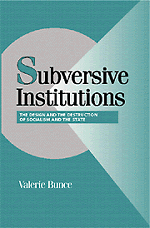Book contents
- Frontmatter
- Contents
- Preface
- 1 The Collapse of Socialism and Socialist States
- 2 Domestic Socialism: Monopoly and Deregulation
- 3 Federalism and the Soviet Bloc: Monopoly and Deregulation
- 4 Leaving Socialism
- 5 Leaving the State
- 6 Violent versus Peaceful State Dismemberment
- 7 Institutions and Opportunities: Constructing and Deconstructing Regimes and States
- Notes
- References
- Index
- Continuation of Series List
2 - Domestic Socialism: Monopoly and Deregulation
Published online by Cambridge University Press: 05 June 2012
- Frontmatter
- Contents
- Preface
- 1 The Collapse of Socialism and Socialist States
- 2 Domestic Socialism: Monopoly and Deregulation
- 3 Federalism and the Soviet Bloc: Monopoly and Deregulation
- 4 Leaving Socialism
- 5 Leaving the State
- 6 Violent versus Peaceful State Dismemberment
- 7 Institutions and Opportunities: Constructing and Deconstructing Regimes and States
- Notes
- References
- Index
- Continuation of Series List
Summary
Here, you can't just say “workers,” because the whole working society has a common denominator of losses and limitations. For the worker it means he earns little and is cheated; the writer, that he is not allowed to write or told to write as he doesn't wish to; for the teacher, that he must say things that are untrue … thus, all are in some way oppressed by the system.
Lech Walesa (quoted in Singer, 1985: 764)In this chapter, I lay out the institutional design of European socialism and assess its long-term consequences for the party, the society, and the economy. As we will discover, in the early years the institutions that defined socialism produced strong regimes, weak societies, and robust economic growth. Socialist institutions, therefore, served the interests of the party in general and its leadership in particular. However, as these regimes matured, a quite opposing set of outcomes began to materialize. These regimes depended for their very survival on maximizing growth and safeguarding the economic and political monopoly of the party, yet their institutional structure began gradually but surely to undermine growth and to deregulate the party's monopoly. European socialism, therefore, began to devolve and to decline long before it officially ended.
SIMILARITIES AMONG PARTY-STATE DICTATORSHIPS
All dictatorships feature by definition a political monopoly or, put differently, certain political results (see especially Przeworski, 1986; Bunce, 1991a, 1991b).
- Type
- Chapter
- Information
- Subversive InstitutionsThe Design and the Destruction of Socialism and the State, pp. 20 - 37Publisher: Cambridge University PressPrint publication year: 1999



